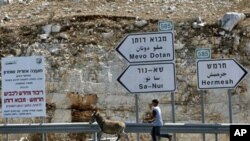U.S. Middle East Envoy George Mitchell is traveling to the region for urgent talks on what the State Department calls the "dilemma" posed by the expiration of Israel's moratorium on settlement building. U.S. officials have welcomed Palestinian restraint in not formally breaking off peace talks.
Mitchell will be visiting the Mideast in an effort aimed at salvaging U.S.-brokered direct Israeli-Palestinian peace talks. Despite appeals from President Obama, among others, the freeze on most West Bank settlement activity declared by Israeli Prime Minister Benjamin Netanyahu ten months ago expired late Sunday.
The Israeli leader faced a rebellion within his right-leaning coalition government if he extended the moratorium, while Palestinians had threatened to quit the talks if was not continued.
Palestinian President Mahmoud Abbas created an opening for U.S. emergency diplomacy when he said in Paris that a decision on the negotiations would await consultations with the Palestine Liberation Organization and the Arab League.
In a talk with reporters on the sidelines of the U.N. General Assembly in New York, State Department Spokesman P.J. Crowley said Palestinian restraint is appreciated.
Crowley said Mitchell and key aides were flying to the region late Monday for contacts aimed at salvaging the talks, which the spokesman said are widely acknowledged to have made progress since opening in Washington September 2.
"The process is important. It's vital. As the parties themselves know, absent these direct negotiations, Israel does not get the security that it needs and deserves, and the Palestinians do not get that state that they want and deserve. So one way or another, the parties have to find a way to continue direct negotiations," said Crowley.
President Obama, delivering the U.S. policy speech to the General Assembly last week, had urged an extension of the settlement moratorium as well as "tangible steps" by Arab states toward normalization of ties with Israel.
On the sidelines of General Assembly debate Monday, a procession of diplomats urged Israel to extend the freeze, among them British Foreign Secretary William Hague. "The United Kingdom believes that it is very important for the moratorium on settlements to be continued, to be extended. This affects the credibility of the negotiations, the viability of the direct talks. So we do look to Israel to extend that settlement freeze," said Hague.
French Foreign Minister Bernard Kouchner, whose government has invited Israeli and Palestinian leaders for peace talks in Paris, told reporters it is too soon to pronounce the regional peace process to be in crisis.
"There was no breakdown yesterday," said Kouchner. "No break. No big incident, and they are following the process of peace, waiting for the meeting of the Arab League next Saturday. I think President Abbas was wise enough to tell us yesterday that it is not the end of the peace talks, the direct talks, and Prime Minister Netanyahu was wise enough to advise the settlers not to move too much."
U.S. Secretary of State Hillary Clinton continued consultations on the Middle East on Monday in New York. Her list of bilateral meetings included one with Syrian Foreign Minister Walid al-Muallem, the first U.S.-Syrian meeting at that level since 2007.
Mitchell Heads Back to Middle East to Deal With Settlements 'Dilemma'




